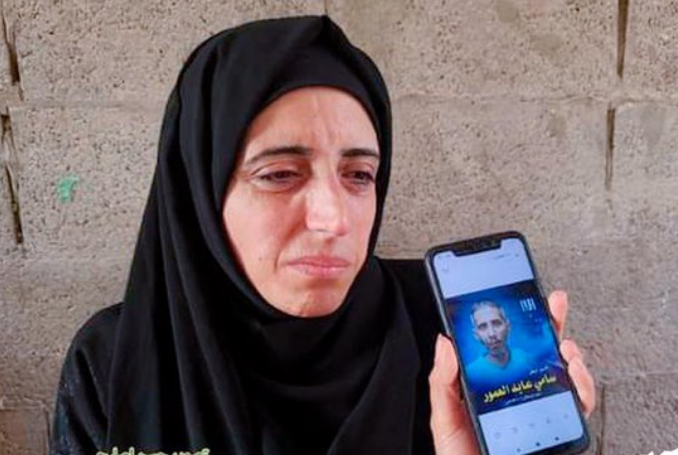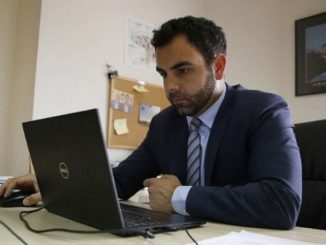
Souad al-Amour, 65, waited a long time for the release of her 2008 detainee son, Sami al-Amour. Her hopes, however, were killed by Sami’s death in an Israeli prison.
The 39-year-old Palestinian detainee, sentenced to 19 years, died in 2021 due to heart disease. The Israel Prison Service (IPS) claimed that Sami had congenital heart disease. “During the 25 years he lived with me, Sami never went to a hospital for any heart disease,” Souad shared. Every day, he climbed and jumped off the conical hill near our home.”
Suaad only knew that her son was suffering from stomach problems and hypertension in prison. “No one knows how I am living now. I can’t believe he is dead. I never expected this; I didn’t know that his health was deteriorating in the last three months,” Souad vented.
Hussain al-Zuraei, an ex-detainee accompanying Sami in the same prison for a while, told The Palestine chronicle, “Sami’s weight was 37 kilograms [81.5 pounds] in his last days, even though he didn’t go on hunger strikes. It was strange…. We fought with IPS for him to get the needed treatment.”
A day prior to Sami’s death, the IPS moved him to the hospital in the Bosta, the Israeli prison vehicle, with metal seats, where the Palestinian detainees are cuffed all the way. He was forced to carry his bag of clothes himself.
Sami and the other detainees in the Bosta had to wait at the gate for hours due to security reasons. The detainees told Hussain that Sami’s condition worsened while waiting, so they loudly knocked on the metal to have a nurse or anyone come. No one responded.
Hassan Kenita, head of the department of detainees and ex-detainees affairs for the southern governorates, told The Palestine Chronicle, “Sami is a vivid example of a policy of health negligence. Logically, one should follow the simplest procedures to get a patient to the hospital. If they truly intended to rescue him, things would have ended up differently. Instead, they transferred him in the Bosta, which is unequipped for patients.”
Souad still didn’t get her son’s body since the IPS rejects the release request of a cadaver until serving all its sentence years.
“I wait for his body. I want to see him. I cry my eyes out every day,” his mother bemoaned. “What would happen if they released him once he died? Take care of the remaining detainees. My son died. Yet many detainees are still in the prisons.”
Still Alive Only to Wait
With misty eyes, one Palestinian mother recalled how she sleeplessly keeps counting the days and the hours for the next visit for her son. Every two months, she takes a long, exhausting nine-hour journey to visit him for 45 minutes.
The Israel detainee’s mother told Palestine Chronicle not to mention her or her son’s name as the IPS would prevent her from visiting her son, sentenced to life imprisonment, due to concerns that revealing his suffering in the prison could result in reprisals against him.
“In my last visit on August 23, 2022, he seemed so tired and told me he came from the clinic three days ago. He was there for artificial breathing since he has an asthma attack,” the detainee’s mother said. “My tears fell uncontrollably when hearing this. I am not with him. No one of his siblings is with him either,” she said, in grief.
Her son, detained at the age of twenty, didn’t have any diseases before his detention. However, now after serving 21 years of his sentence, he suffers from stomach ulcer, asthma attack, anemia, and hemorrhoids. He underwent four operations for the hemorrhoids yet all of them failed; he still can’t sit properly.
“On every visit, I tell him, ‘I want to break this glass between me and you.’ I just want to reach my son and touch him. He is my son and I can’t touch him,” she said.
The mother is aware she doesn’t have complete information about her son’s life in prison. “My son doesn’t tell me everything in order not to feel downhearted.”
However, Alaa AbuJazer, an ex-detainee and the 2006-2021 detainees’ representative, said that according to 2019 statistics, 90% of the detainees in the Israeli prison suffered different types of stomach problems. “The chickens detainees eat are eggy and non-nutritive. They have nothing to do with chickens,” Alaa said.
Alaa explained why many detainees have anemia and hemorrhoids, saying “Once a month, each detainee is allowed to buy three kgs of vegetables and fruits. So, each one buys about two kilos of vegetables such as onions and potatoes, and a kilo of fruits. And they gave each of us at their expense 180 grams of specific kinds of fruits daily. We mainly rely on rice and bread to feel full.”
Many have hemorrhoids since, during the investigation, the detainees sleep on the ground, which is humid. Under the pretext of “security reasons,” the prison room windows are too small, so the steam coming from cooking and hot showers fills them. There is no ventilation, so many detainees have asthma attacks.
Mohammed Abuhashem, a legal researcher at the Palestinian Center for Human Rights, clarified, “Fourth Geneva Convention, in its articles (89-92), makes obligations on the detaining state to ensure the right to health for detainees by providing for them the needed medical care as well as adequate health conditions including proper balanced nutrition, precautionary health measures, and proper detention facilities. Such rights shall not be alienated under any circumstances or under the claim of security reasons.”
“Some detainees catch the flu many times without treatment. When we tell them someone has the flu, they say he has to take a painkiller and hot beverages. The untreated inflammation in the lungs culminates and turns into an asthma attack,” Alaa revealed.
The mother said that in one of the visits, her son told her if he gets released, he wants her to prepare for him stuffed vegetables, spinach pastry, and somaqia, a Palestinian dish. “I keep praying to Allah to let me live until he is released to make for him all the food he misses,” the mother said.
Kenita said, “In 1987, Ibrahim Alyan, an ex-detainee, suffered heart disease and he underwent an open-heart surgery which was successful. He is still alive and is highly active. Nowadays under the new Israeli governments imposing new policies, if a detainee had hypertension or diabetes, we expect the worst: death. Despite the fact that Israel now is surely more developed in the medical field than in the past.”
Abuhashem added,
“The testimonies that the detainees suffer from systematic and intended medical negligence bear strong clues that indicate the possibility of war crimes and could amount to genocide against Palestinian detainees; however, evidence shall be collected to prove such crimes. IPS has to open the prisons for international inspection and investigation so that the whole world can know what is happening against Palestinian detainees inside Israeli prisons.”

Lubna Abuhashem is a freelance writer and translator from Gaza. We Are Not Numbers contributed this article to The Palestine Chronicle.







